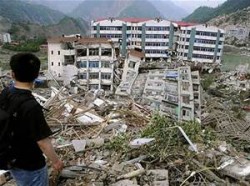The Mental Health Effects of Natural Disasters
In recent years the world has more than a few natural disasters. From hurricane Katrina to tsunamis and earthquakes, no one can deny that Mother Nature can ravage the planet just as effectively as anything man made. Natural disasters are devastating multiple levels. Most people only consider the physical damage, the loss of life, and the displacement involved. Unfortunately, the damage goes a lot farther than simple physical issues. People often overlook the impact that a natural disaster can have on the mental health for all of those who even remotely involved. When considering the mental health effects of a natural disaster it is important to know what a natural disaster is as well as the long and short term effects of one.
Call 888-647-0051 (Who Answers?) toll free anytime for help finding mental health treatment and support.
What is Considered a Natural Disaster

Natural disasters can trigger trauma, depression, anxiety and other conditions.
A natural disaster is any event that creates large scale property loss and / or loss of life. According to the Federal Emergency Management Agency or FEMA, natural disasters are caused by:
- blizzards or severe winter storms,
- droughts,
- earthquakes,
- extreme heat or cold,
- floods or excessive watershed,
- hurricanes,
- landslides or extreme debris flows,
- severe weather,
- space weather phenomena,
- severe thunderstorms or lightning storms,
- tidal waves or tsunamis,
- tornados,
- volcanoes,
- wildfires, and
- any combination of these.
Although one or more of these conditions must exist, whether an event reaches natural disaster status depends on the severity. A hurricane can pass by and not do any damage or it can hit a country full on and cause billions of dollars worth of damage. The severity of the damage to people or property is what determines whether a situation is a natural disaster or not. Each of these conditions can cause physical and mental damage to a person regardless of how severe it is. A general rule is the more severe the disaster, the more severe the mental after effects.
Short Term Mental Health Effects
The short term mental effects of a natural disaster are usually taken care of by what is termed by FEMA as psychological first aid or crisis counseling. This consists of assessing, educating, supporting, and informing the survivors of a natural disaster. Depending on how severe the reaction, they might also refer people to further services.
In the short term survivors are at risk for depression, anxiety, confusion, panic, extreme stress disorders, addiction, and the beginning of post traumatic stress disorder. The stress of a natural disaster can also kick off underlying conditions that without the added stressor of the disaster would otherwise remain dormant. This includes, schizophrenia, mood disorders, and other psychiatric conditions.
Another short term mental effect that needs to be mentioned is the secondary effects that are not from the disaster itself but the way that people behave during and after the actual event. This mob psychology is seen in the lawless period immediately following a natural disaster. In some cases rape, assault, theft, child abuse, domestic violence, and other crimes take place. These contribute to both the short term and long term effects of a natural disaster. The short term mental health effects can lead to extreme long term disorders.
Long Term Mental Health Effects
The long term mental health effects of natural disasters are far more pervasive than many people believe. On the surface, after people clean up and everything appears to be fine. Several disorders persist if not caught and treated early. These disorders are:
- post traumatic stress disorder,
- acute trauma disorder,
- depression,
- anxiety and anxiety related disorders,
- panic attacks,
- night terrors, and
- other mood disorders.
How a person reacts during the natural disaster is often a predictor of their long term mental health effects. These effects are usually not permanent particularly when the affected individual seeks treatment immediately after the disaster. The long term mental effects usually do not last more than a few months to a few years but in some cases, especially when they are not recognized or treated immediately they can develop into actual mental illness. This is particularly true in cases of depression, post traumatic stress disorder, and anxiety. When they develop into a illness or disorder they are treatable with mediation, counseling, and other normal means.
For help finding mental health treatment and support call 888-647-0051 (Who Answers?) toll free anytime.
How to Minimize the Mental Damage
The World Health Organization, the Substance Abuse and Mental Health Services Administration, FEMA, and a variety of other agencies, all have programs set up for dealing with the physical and mental effects of the disaster. Although there is no way to minimize the impact of the natural disaster, there are ways to circumvent the long term issues.
According to the American Psychological Association, acknowledging the mental health effects is the first step to minimizing the damage. If the signs are ignored it is possible for the damage to become permanent. By training first responders, counselors, police officers, and other agents in recognizing, the symptoms of common traumatic mental health effects, these organizations help prevent long term mental illness.
Supportive and trauma counseling immediately after the disaster are extremely helpful for preventing long term mental health damage. These counseling programs continue long after the actual disaster is over. During the assessment and counseling phase, first responders and counselors can refer those who are likely to suffer long term consequences to the proper resources.
The mental health effects of natural disasters can be devastating if left untreated. The depression, PTSD, and other trauma related mental health disorders are prevalent during and in the aftermath of natural disasters. If treated early, most of these conditions subside within a months to a few years after the disaster.





